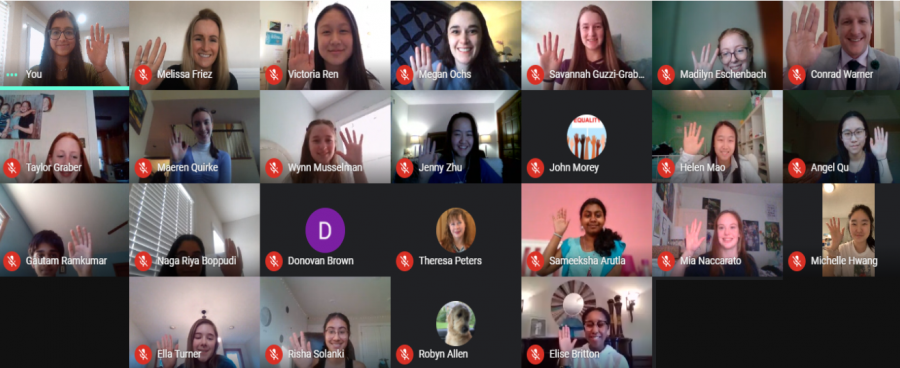International Women’s Day: Celebrating Voices at NA
A group of students and teachers meet online and take the pledge to #ChoosetoChallenge
March 8th is currently International Women’s Day (IWD), but it was not always celebrated on this day. In fact, it was observed across the United States on February 28, 1909, and was continuously celebrated on the last Sunday of February until 1913. In 1910, a second International Conference of Working Women was held in Copenhagen, Denmark. A woman named Clara Zetkin tabled the idea of an International Women’s Day. She proposed that every year in every country there should be a celebration on the same day – a Women’s Day – to press for their demands. The conference of over 100 women from 17 countries greeted Zetkin’s suggestion with unanimous approval.
Following this decision, International Women’s Day was honored for the first time in Austria, Denmark, Germany, and Switzerland on March 19th. More than one million women and men attended the rallies campaigning for women’s rights to work, vote, be trained, hold public office, and end discrimination. The Triangle fire in New York City on March 25, which killed 146 women workers, drew significant attention to working conditions and labor legislation in the United States that became a focus of subsequent International Women’s Day events. 1911 also saw the women’s Bread and Roses campaign.
On the eve of World War I, while campaigning for peace, Russian women observed their first International Women’s Day on February 23, the last Sunday in February. Following discussions, International Women’s Day was agreed to be marked annually on March 8, and this day has remained the global date for International Women’s Day ever since.
International Women’s Day was celebrated for the first time by the United Nations in 1975. However, by the 2000s, there was little activity occurring for International Women’s Day in most countries. The world had moved on and, in many spheres, feminism wasn’t a popular topic.
The internationalwomensday.com platform was launched with the specific purpose of re-energizing the day celebrating and making the achievements of women visible while continuing the call for accelerating gender parity.
2011 saw the century of International Women’s Day, with the first IWD event held exactly 100 years ago in 1911 in Austria, Denmark, Germany, and Switzerland. In the United States, President Barack Obama proclaimed March 2011 to be “Women’s History Month”, calling Americans to mark IWD by reflecting on “the extraordinary accomplishments of women” in shaping the country’s history. The world has witnessed a significant change and attitudinal shift in both women’s and society’s thoughts about women’s equality and emancipation.
Many from a younger generation may feel that all the battles have been won for women while many feminists from the 1970’s know only too well the longevity and ingrained complexity of patriarchy. The unfortunate fact is that women are still not paid equally to that of their male counterparts, women still are not present in equal numbers in business or politics, women’s education and health around the world are generally worse than that of men’s, and women are more likely to be victims of violence. However, great improvements have been made. And so each year the world inspires women and celebrates their achievements.
Victoria Ren, Elise Britton, Savannah Guzzi-Graber, and Thrisha Kalpatthi observed that there was no significant event or mention of this day in the North Allegheny School District. They created the event held on Monday, March 8th, 2021 in less than a week. They asked Mr. Warner, Madi Eschenbach, Mrs. Ochs, and Dr. Friez to speak. Mr. Warner is one of NAI’s World Cultures and Psychology teachers, and Madi is one of his World Cultures and Psychology students. They were there to talk about women and how, throughout history, they have left out. Mrs. Ochs is one of NAI’s Biology teachers, and she spoke about women in STEM, as well as her own experiences as to coming to where she is today. Last but certainly not least was Dr. Friez, the incoming superintendent of North Allegheny. She discussed the position she currently holds and her experiences in becoming the person she is today. The discussions lasted for over an hour after the designated time. The topics ranged from intersectionality to what many women deal with on a daily basis.
Now, what is next? There are many topics that were not discussed, so there is going to be a continuation within the next few weeks during Wellness Wednesday from 12:30-1:30. Please join if you are interested! There will be new discussions each week. These conversations are not a “women’s thing”, for anyone is welcome and encouraged to attend.


